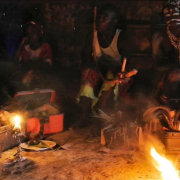ASCL Seminar: Obscure Capital and Containers: History, Objects, and Power in Central Africa
Primary tabs

Professor Bernault will explore the history of containers in Central Africa. Serving as bridges between domestic and public power, personal accumulation of wealth, and market dynamics, imported wooden trunks, suitcases, wooden crates and metal canteens have been integral to the region's trade routes since the 16th century. Special coffers were used to carry goods for buying slaves, and wealthy families stored riches in imported trunks.
After the 1850s, foreign visitors brought new technologies like phonographs, electric dynamos, and magnets to Central Africa, showcasing them to "dazzle the natives" (Larkin 2008). These strategies and devices reflected the old Central African methods to create magical charms using techniques of invisibility and concealment.
Professor Bernault builds on this to introduce the concept of "obscure capital," a type of wealth built on accumulation and secrecy. She suggests that examining containers and capital in Central Africa can help us understand the complex and hidden forms of modern capitalism. In addition to the more visible financial assets traded online, less transparent and slower forms of capital, like the vast trade in containers and the presence of national safes, continue to significantly influence economic systems and societies in ways that often go unnoticed.
This event takes places in Leiden in person. For registrees who cannot travel to Leiden a link to an online platform will be sent one day before the start of the event.
 Florence Bernault is a professor at Sciences Po in Paris, specializing in African History, African Cultures, and Colonialism. Prior to this, she was a professor of African History at the University of Madison-Wisconsin (1996-2018). Her research focuses on the political and cultural history of Central Africa, exploring the intersection of African and European societies, particularly through penal regimes, electoral systems, and the realms of the material and intangible. Her work is interdisciplinary, combining archival research with fieldwork, and often aims to connect historical processes with contemporary issues.
Florence Bernault is a professor at Sciences Po in Paris, specializing in African History, African Cultures, and Colonialism. Prior to this, she was a professor of African History at the University of Madison-Wisconsin (1996-2018). Her research focuses on the political and cultural history of Central Africa, exploring the intersection of African and European societies, particularly through penal regimes, electoral systems, and the realms of the material and intangible. Her work is interdisciplinary, combining archival research with fieldwork, and often aims to connect historical processes with contemporary issues.
Bernault’s first book, Démocraties ambiguës en Afrique centrale (1996), examined political party organization and elections in Congo-Brazzaville and Gabon in the 1940s and 1960s. Her second book, A History of Prisons and Confinement in Africa (2003), revived the study of prisons in Africa, analyzing colonial carceral regimes and their adaptation in African societies. In 2019, she published Colonial Transactions with Duke University Press, a study of witchcraft, power, and social relations in Gabon, which challenges traditional notions of colonial domination.
Her current research project, Global Intimacy and the Double Life of Objects, explores the role of objects like money, medicaments, and charms in shaping new subjectivities across racial, cultural, and geographical boundaries. Bernault’s work has been recognized with numerous fellowships, including from the Simon Guggenheim Memorial Foundation (2001) and the Netherlands Institute for Advanced Studies (2013-2014). She frequently writes on contemporary events in Central Africa for The Conversation.

